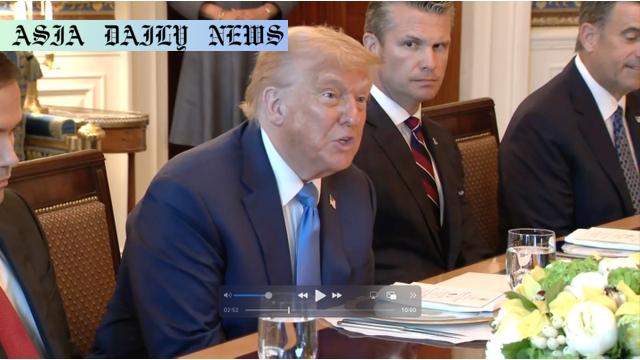Weapons: Trump frustrated over poor US coordination on Ukraine arms support.
- Trump increasingly frustrated at miscoordination on US arms support to Ukraine.
- Reversal on weapons supply highlights internal tension in decision-making.
- Pentagon’s unauthorized pause and lack of communication identified as issues.

Trump’s Frustration Over Ukraine Weapons Coordination
President Donald Trump has expressed increasing frustration over the lack of coordination within his administration regarding the supply of US arms to Ukraine. Reports from major media outlets, including the Associated Press, indicate that internal communication failures have led to inconsistent messaging and decisions surrounding military aid. At the center of this issue is a temporary halt in the transfer of defensive weapons to Ukraine, tied to a review of military support by the Defense Department.
The Defense Secretary, Pete Hegseth, reportedly approved this pause without informing the White House or Secretary of State Marco Rubio ahead of time. This lack of communication has led to dissatisfaction in the administration, with Trump reportedly reversing the pause on arms shipments. This reversal was further solidified by a Pentagon announcement confirming additional arms would soon be dispatched to Ukraine. Observers interpret these governmental missteps as a reflection of broader issues in inter-agency coordination under the current leadership.
The Shift in Trump’s Stance on Ukraine
President Trump’s evolving stance on Ukraine is also noteworthy. Initially perceived as less supportive of Kyiv, the president now appears to have pivoted toward a stronger position against Russia’s aggression. Reports suggest this shift arises from mounting frustration with Russian President Vladimir Putin, who has so far resisted calls for a ceasefire and continues to escalate military actions in Ukraine. Trump’s consideration of deploying a Patriot air-defense system indicates an increasing willingness to provide advanced military aid to Ukraine.
This development marks a turning point in the U.S.’s role in supporting Ukraine’s defense efforts. By stepping up military aid, the administration is signaling to Russia that the ongoing aggression will face strong international resistance. However, the apparent lack of communication within Trump’s government adds a layer of complexity, raising questions about the efficiency and accountability of the decision-making process. The balance between rapid responses and thoughtful, coordinated policy reveals inherent challenges in the current political environment.
Analyzing the Strategic and Moral Implications
Providing military assistance to Ukraine is both a strategic and moral decision for the United States. On one hand, the flow of defensive weapons enables Ukraine to counter Russia’s growing military pressure, offering a lifeline to a nation fighting for its sovereignty. On the other hand, such military support risks provoking further tensions between the U.S. and Russia, potentially leading to a broader geopolitical conflict.
The controversy surrounding the temporary suspension of arms to Ukraine also illustrates the internal conflicts within Trump’s administration. Gaps in inter-departmental coordination can lead to delays, conflicting policies, and mistrust among key stakeholders, complicating the administration’s efforts to shaping a consistent foreign policy strategy. For Ukraine, ensuring continuity in U.S. support is pivotal amid ongoing hostilities, and any visible hesitations from Washington may have far-reaching implications on the ground for both Ukrainian forces and civilians.
Concluding Thoughts
Ultimately, the issue of weapons shipments to Ukraine shines a spotlight on the pressing need for cohesive governance amid global crises. Effective communication is vital to ensuring that decisions resonate both internally within government and externally on the international stage. For Trump, overcoming internal hurdles may prove essential to maintaining both his administration’s credibility and America’s role as a global leader in opposing unilateral acts of war.



Commentary
The Challenge of Policy Coordination in Trump’s Administration
The recent developments surrounding President Trump’s approach to arms support for Ukraine shed light on a recurring challenge for his administration: effective inter-agency coordination. The apparent lack of communication between the Department of Defense and the White House regarding the temporary pause in weapons shipments reflects deeper systemic issues. In any administration, transparent communication channels are critical, especially when making decisions that impact global security and foreign alliances.
For Trump, addressing these internal dynamics is particularly crucial. Inconsistent messaging or delayed actions can not only weaken domestic trust but also signal vulnerability to international observers, including adversaries like Russia. As tensions continue to mount over the conflict in Ukraine, streamlining decision-making processes can help demonstrate America’s unified stance in the global arena.
Ukraine as a Litmus Test for U.S. Foreign Policy
Ukraine’s struggle against Russian aggression serves as a litmus test for how the U.S. balances its strategic interests with its role as a defender of democracy. The decision to increase weapons shipments, including a potential Patriot air-defense system, is a clear signal of support for Kyiv. However, incidents like the short-lived weapons pause raise questions about the extent to which the United States can be relied upon in critical moments.
Furthermore, Trump’s pivot toward stronger support for Ukraine highlights the importance of adjusting foreign policy in response to evolving geopolitical realities. Putin’s refusal to back down has brought into sharp focus the need for Western powers to present a united front. Yet, providing military aid is only one aspect; political and economic backing for Ukraine is equally critical to ensuring long-term stability and resistance against external threats.
Reflections on the Complexity of Global Conflicts
The situation between Russia and Ukraine underscores the complexities of global conflicts in the modern age. For nations like the United States, decisions about military support are imbued with ethical, strategic, and economic considerations. While sending weapons can help deter aggression, it also carries the risk of escalation, particularly when dealing with a nuclear-armed adversary like Russia. Striking this balance requires both decisiveness and careful diplomacy.
In the broader context, Trump’s administration’s handling of Ukraine could set precedents for how global conflicts are managed in the years to come. By addressing inter-agency missteps and reaffirming commitments to allies, the U.S. has the opportunity to reinforce its leadership role on the world stage. However, this delicate dance of diplomacy and action requires constant refinement, something that is evident as Trump navigates the road ahead.